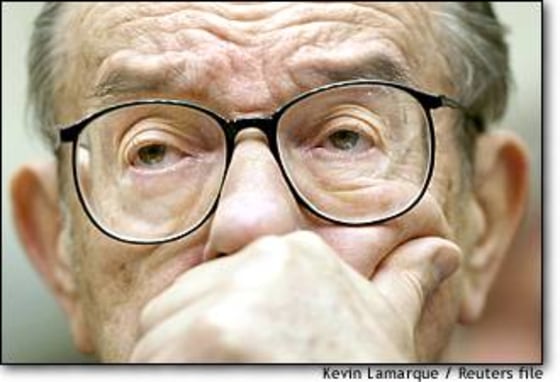Federal Reserve Chairman Alan Greenspan told Congress Tuesday that uncertainty about a possible war in Iraq is the main factor holding back the economy and that fiscal stimulus probably is not needed to ensure stronger growth this year.
In testimony before the Senate Banking Committee, the influential central bank chief gave a partial endorsement to President Bush’s economic plan but warned against the possibility of “ever widening” budget deficits that would hamper growth and boost long-term interest rates.
Under questioning from senators on the panel, Greenspan noted that he has long supported elimination of the double tax on corporate dividends, the centerpiece of the $674 billion White House proposal. Greenspan said he would prefer to see the change made at the corporate level but said Bush’s plan to exclude dividends from individual income tax “makes a good deal of sense over the long run as well.”
But he stressed that tax reform should be made in a “revenue neutral” manner, meaning that any loss of revenue to the Treasury should be balanced by corresponding spending cuts or tax increases. And Greenspan strongly implied that Bush’s proposal for an additional $300 billion in tax cuts over the next 10 years is not needed.
“I’m one of the few people who is still not as yet convinced that stimulus is a desirable policy at this particular point,” Greenspan said in response to a question from Sen. Wayne Allard, R-Colo. “It depends very much on how one reads what is effectively going on under the whole structure of geopolitical and other risk. And until we can make a judgment as to whether in fact there is underlying deterioration going on - and my own judgment is I suspect not - then stimulus is actually premature.”
WAR UNCERTAINTY CLOUDS OUTLOOK
Greenspan supported the widely held view that the looming possibility of war in Iraq is holding back business investing and spending and that a successful outcome to the standoff is likely to pave the way for rapid improvement in growth, without the need for added fiscal stimulus.
“The intensification of geopolitical risks makes discerning the economic path ahead especially difficult,” the 76-year-old Fed chief said. He said the Fed’s best estimate is that the economy is “poised to grow more rapidly” once the geopolitical uncertainties diminish. But he acknowledged that he could be wrong, in which case the economy could benefit from fiscal stimulus or even another reduction in short-term interest rates from the Fed.
“I don’t think anyone can say he came out and supported the Bush economic plan — clearly he didn’t,” said Tony Crescenzi, chief bond market strategist at Miller Tabak & Co. “He seems far more interested in cutting the budget deficit than cutting taxes.”
In declaring that the economy probably does not require further stimulus, Greenspan struck a cautiously optimistic tone that was widely expected, in line with recent Fed statements.
But stock prices tumbled, partly because of Greenspan’s tough talk on budget deficits but also because of nervousness over a broadcast audio statement believed to be from Al-Qaida leader Osama bin Laden.
David Rosenberg, chief economist for Merrill Lynch, said he was mildly surprised Greenspan made no mention of any need to tighten credit later in the year, given the Fed’s relatively optimistic forecast.
“There is such a wide consensus out there that believes the Fed is going to raise interest rates this year,” he said. “I don’t think the Fed is going to stand in the way — I think it would welcome the growth.”
Underscoring the cautiously optimistic outlook, Greenspan released a Fed economic forecast that projected overall economic growth of 3.25 percent to 3.5 percent this year, down from a forecast of 3.5 to 4.0 percent released last July. Last year, GDP grew only 2.8 percent, and given this year’s slow start, the Fed’s forecast would mean robust growth averaging 3.9 percent in the final nine months of the year, Rosenberg estimated.
But Greenspan reiterated the Fed view that inflation poses no current threat to the economy, even though the central bank has cut short-term interest rates 12 times over the past two years in an effort to spark faster growth.
The economy fell into recession in March 2001 and has been expanding only in fits and starts since early 2002. In the fourth quarter of last year, the economy, as measured by gross domestic product, grew by only 0.7 percent, its slowest rate in more than a year and a sharp slowdown from the 4 percent growth of the third quarter.
Greenspan said that lean business inventories should support rising production and that household spending has continued to hold up well. But he added: “We have yet to see convincing signs of a rebound in business outlays.”
Greenspan devoted much of his opening statement to lecturing Congress on the need to restore fiscal discipline and avoid the prospect of growing deficits.
“There should be little disagreement about the need to re-establish budget discipline,” he said.
The administration, in releasing its budget last week, projected record deficits of $304 billion this year and $307 billion next year. Greenspan called that “sobering,” especially in light of the looming retirement of the Baby Boom generation, which will place unprecedented demands on the nation’s Social Security system.
He urged Congress to adopt a new accounting system that would more accurately track the growing liabilities of Social Security and Medicare. And he said Congress and the White House should return to a “pay as you go” budget system that would hold the federal budget deficit at minimal levels of no more than 1 to 2 percent of GDP.
“There is no question that as deficits go up, contrary to what some have said, it does affect long-term interest rates, it does have a negative impact on the economy, unless attended,” he said.
